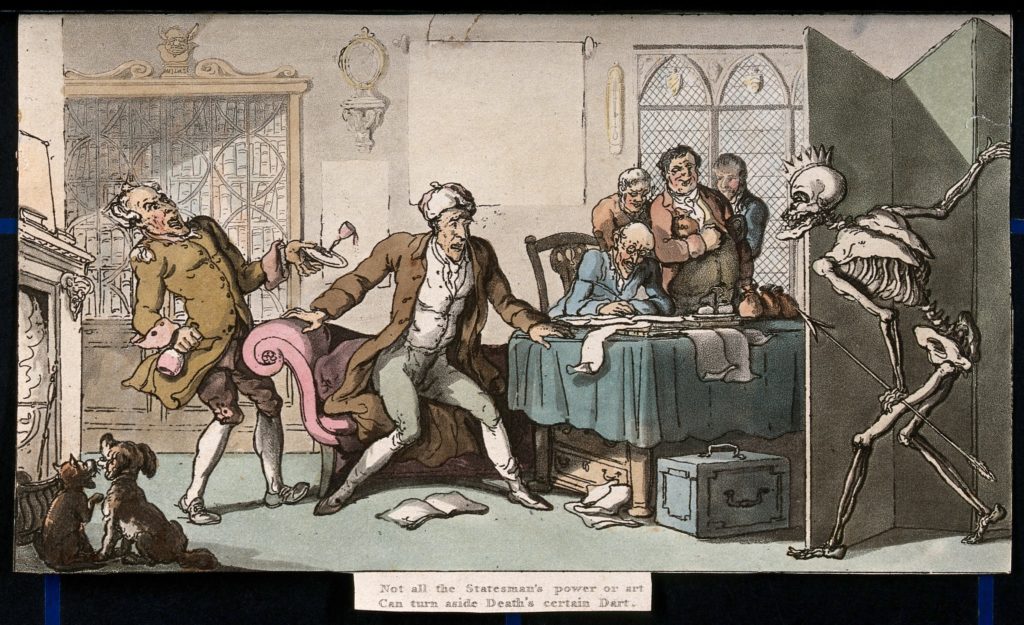Famous last words
PAUL WOOD remembers how past PMs passed

The dance of death: the statesman. Coloured aquatint by T. Rowlandson, 1816.
Margaret Thatcher’s death makes me want to sit upon the ground and tell sad stories of the deaths of Prime Ministers.
The Prime Minister whose death I most often think of is that of Lord Rosebery, for some reason. Most Prime Ministers outlive their eras but few by so much as Gladstone’s successor as Liberal Prime Minister. Lord Rosebery, as he lay dying in 1929, 34 years after he had briefly been Prime Minister, sent his valet to buy a gramophone and one gramophone record. The servants played the Eton Boating Song, over and over again, in the shuttered bedroom, until the earl, forgotten by the world of flappers and moving pictures, was dead.He was only Prime Minister for fifteen months but his life must be judged to have been unusually successful. He once said that he had three aims in life: to win the Derby, to marry an heiress and to become Prime Minister. He achieved all three and won the Derby twice during his brief premiership. I do not know what his last words were and I wonder what were Lady Thatcher’s.
Queen Victoria wanted to do Disraeli the honour of visiting him in his sickbed but he declined the honour with what were said to be his last words:
Why should I see her? She will want to give a message to Albert.
He had fawned on the Queen for years, but now saw no reason to continue in articulo mortis.
Another version of his last words is:
I had rather live but I am not afraid to die
but they sound to me as if written for public consumption. While he lay dying, although he had converted to Anglicanism as a boy, he was heard to murmur a Jewish death prayer.
Sir Henry Campbell-Bannerman’s last words were
This is not the end of me.
George Canning’s last words were:
Spain and Portugal.
William Pitt the Younger’s were
Oh my country! How I leave my country!
Or alternatively:
How I love my country!
His nephew, James Stanhope, who was at his deathbed, is the authority for the latter version and is a better authority than Disraeli, who may have originated the widely believed story that Pitt’s last words were:
I think I could eat one of Bellamy’s pork pies.
Lord Palmerston’s last words are said to have been:
Die, my dear Doctor? That’s the last thing I shall do.
But this, though very well known, is not well sourced.
Lord Derby’s last words convey aristocratic disdain:
Bored to utter extinction.
Chamberlain’s last words also seem to convey the character of the man:
Approaching dissolution brings relief.
He was diagnosed with bowel cancer just after he left office. Had he lived in good health he would have run the home front but he would have remained leader of the Conservative Party and therefore shared power with Churchill.
Shortly before his death, Chamberlain wrote an apologia pro vita sua in a letter to Sir John Simon:
…it was the hope of doing something to improve the conditions of life for the poorer people that brought me at past middle life into politics, and it is some satisfaction to me that I was able to carry out some part of my ambition, even though its permanency may be challenged by the destruction of war. For the rest I regret nothing that I have done & I can see nothing undone that I ought to have done. I am therefore content to accept the fate that has so suddenly overtaken me.
What a terrible hand Chamberlain had to play and how should he have played it?
He was a Unitarian, but he, along with Bonar Law and Clement Attlee, neither of whom believed in God, are the only three twentieth century Prime Ministers to have been buried in Westminster Abbey.
Poor Spencer Perceval’s last words were to the point:
Oh, I have been murdered.
He was a good, able man and would have been a fine Prime Minister had he not been killed. He should win modern day approval for coming from a much more obscure family than Messrs. Cameron, Clegg and Miliband. A book came out last year about the murder. He would probably have held office for as long as, after his assassination, Lord Liverpool did and therefore for longer than Mrs. Thatcher.
Sir Winston Churchill’s last words were:
I’m bored with it all.
On his last birthday, Churchill said to his daughters:
I have achieved much to have achieved nothing at all.
I think this might be the judgement of history.
PAUL WOOD is an English writer living in Bucharest. This article first appeared on his blog – http://pvewood.blogspot.co.uk










